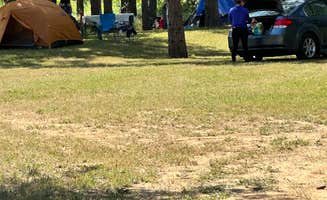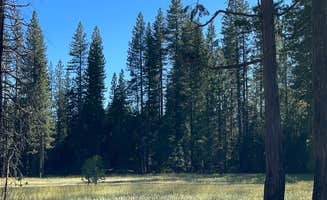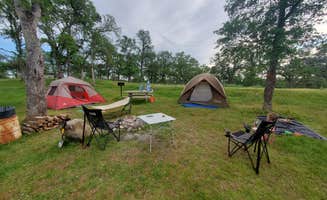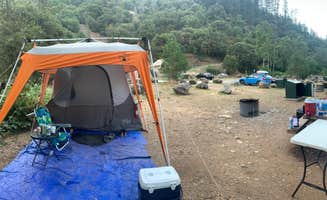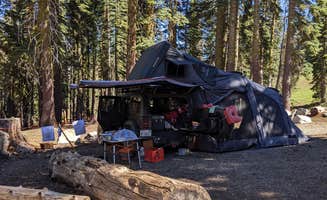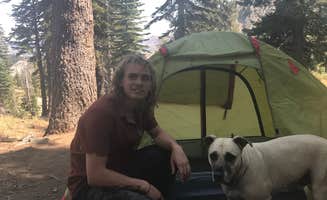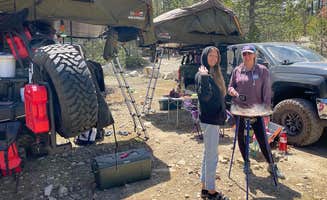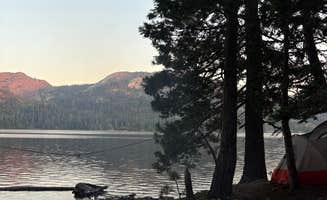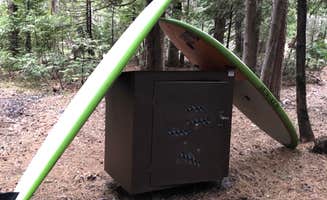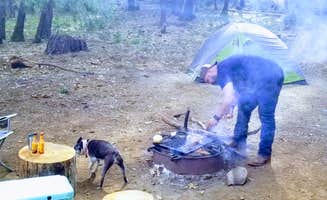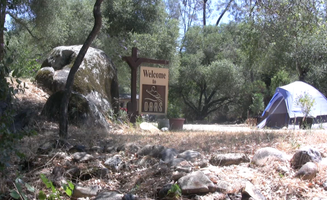Tent camping in the Sierra Nevada foothills near Forest Knolls, California offers access to lakes and rivers where summer water temperatures vary dramatically between locations. The region sits at elevations between 1,500-4,000 feet, creating moderate temperature differences from surrounding valleys. Many campgrounds maintain vault toilets that receive weekly cleaning service, though water availability differs significantly across sites.
What to do
Swim in warm lakes: Rucker Lake Campground features unusually warm water perfect for summer swimming. The lake has "an amazing rope swing not for the faint of heart" that requires "a floatation device like a blow up with oars to get there," according to visitor Nick K.
Gold panning: Fiddle Creek provides access to the Yuba River where "people pan for gold" according to Amber Q., who adds that "some walk up the road to Jackson Hole to float down. About 5 mins up, pass a few houses on your right."
Kayaking on peaceful waters: Lake Spaulding Campground offers excellent kayaking opportunities, though John and Trish N. warn that "it gets choppy in the afternoon so be aware." The campground features sites "set among huge boulders" that "can be very private."
Winter camping: Camp Far West North Shore remains open year-round, offering a completely different experience in off-season. Ray B. notes, "We were the only people anywhere except for folks in the full hook-up area. We were right on the lake at the end of a peninsula. Not a sound except for the birds."
What campers like
Natural cooling: The high elevation campgrounds provide natural temperature regulation. At Onion Valley Campground in Tahoe National Forest, visitors appreciate the "open fields of wild flowers" that "allow for some great star gazing night," according to Caroline B.
Walk-in tent sites: Many campers prefer the walk-in sites for their privacy despite the extra effort. At Rucker Lake, Haidon M. explains: "The camp spots were a good size and with fire pits and bench tables BUT there isn't a road to actually drive around the spots, you have to park and walk all your stuff down to your spot."
River proximity: Lake Clementine Boat In at Auburn State Recreation Area offers sites with varying river access. Drew M. notes "sites 1-6 offer little shade to none, the rest of the sites offer a good amount of shade" and that "the river is extremely clean and clear with good temperature."
Secluded spots: For those seeking quiet, Ian F. describes Onion Valley Campground as "nice and secluded with not many sites so not many people or noise. Close to some good hiking trails."
What you should know
Poison oak presence: Peninsula Camping and Boating Resort has reported poison oak issues. Laura G. warns, "When we arrived to the campground, we found that the sites we reserved were on a hill, and poison oak between them."
Fire restrictions: Fire regulations vary by location and season. At Camp Far West North Shore, Aariana N. found that "the fire pits and bbqs are non functioning, we had to build our own fire ring."
Road conditions: Access to Rucker Lake requires traveling on dirt roads. Nick K. advises "AWD recommended but not totally needed" and reminds campers to "bring a lot of drinking/dishes water (no spigots, no sinks)."
Highway noise: Some campgrounds sit near busy roads. L. notes that Fiddle Creek's "close proximity to Hwy 49 (maybe 75 feet away) makes for more headlights and traffic noise than I'm used to when camping (especially since the majority of traffic is from loud trucks that zoom by at 50-60 mph)."
Off-season facilities: During non-peak seasons, expect limited facilities. Lee D. found at Lake Clementine that "Normally, there are 18 designated sites that are reservable only from May 1– October 15. What we didn't know until we arrived was that only Sites 1-7 were open after this date."
Tips for camping with families
Bring cleaning supplies: At Camp Far West North Shore, broken glass has been reported. Aariana N. shares, "the broken glass....... man it was everywhere! You could tell people come to party here."
Consider bathroom proximity: When camping with children, choose sites near restrooms. At Oracle Oak Grove, Jake C. notes that "they have kayaks and other water sport equipment available for campers to make your stay even more memorable."
Pack extra water: For tent camping at Forest Knolls sites without potable water, plan accordingly. Cody R. at Rucker Lake advises, "No drinking water available, unless you purify your own from the lake."
Pack for temperature swings: Tent campers should prepare for significant day-to-night temperature changes. Anna V. shares that at Lake Clementine, "Using hand warmers and a tent warmer we did fine with the cold nights" during November camping.
Tips from RVers
Length restrictions: Large RVs face limitations at most Forest Knolls area campgrounds. At Lake Clementine Boat In, Lee D. warns, "The access road is about six miles of curvy, hilly, and narrow (sometimes only one lane) pavement. There is a sign prohibiting trailers; our 18-foot camper van did fine but anything much larger would definitely be challenged."
Site leveling challenges: Finding level sites can be difficult. Lee D. notes at Lake Clementine, "Most of the sites that have a 'driveway' were not level, except for Sites 5 and 6."
Off-season advantages: Winter RV camping offers more privacy. Ray B. explains that at Camp Far West, "We did a bike ride along the lake through the undeveloped overflow area and beyond to the north east end of the property. It is our understanding that this campground is very busy during the summer, and a very different experience when all the watercraft are on the lake."


